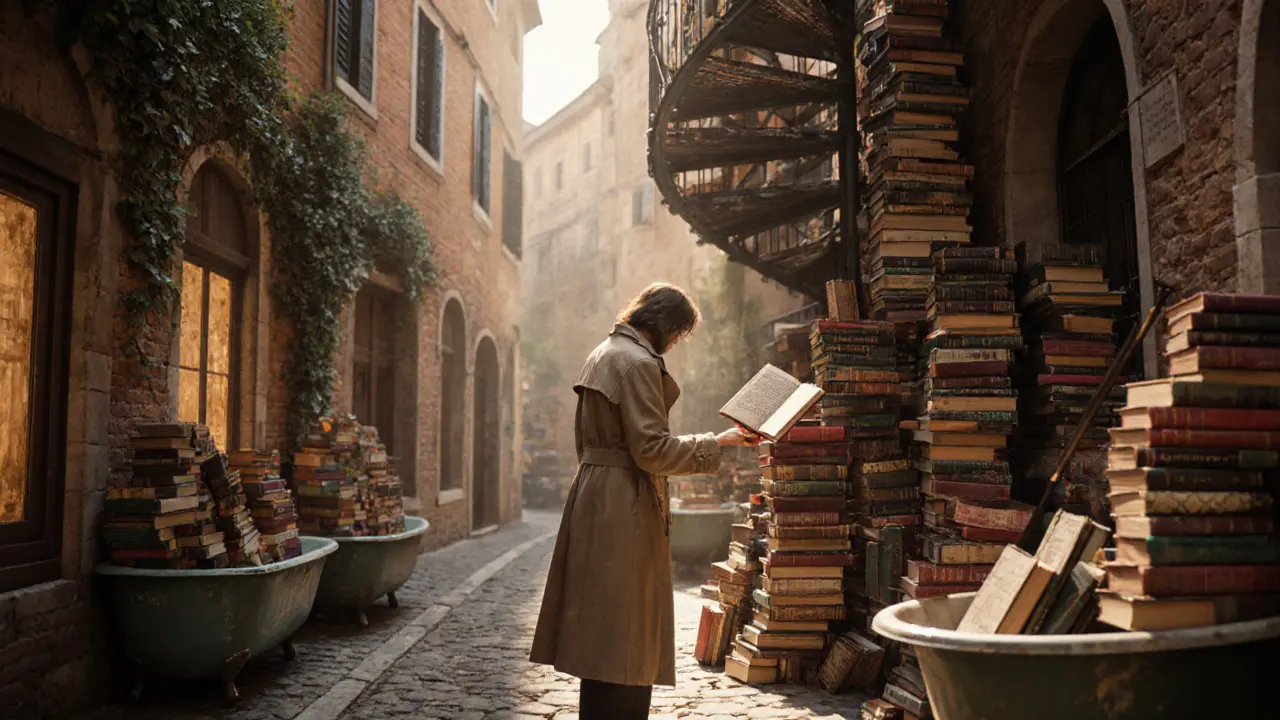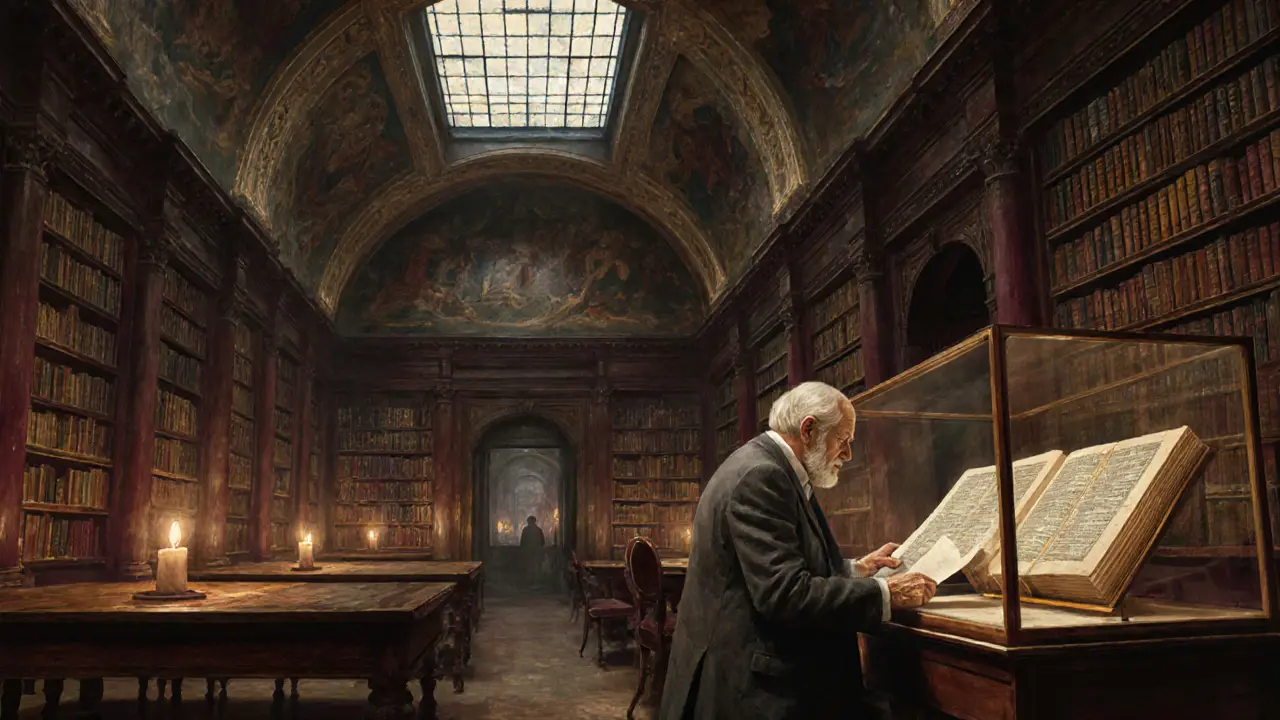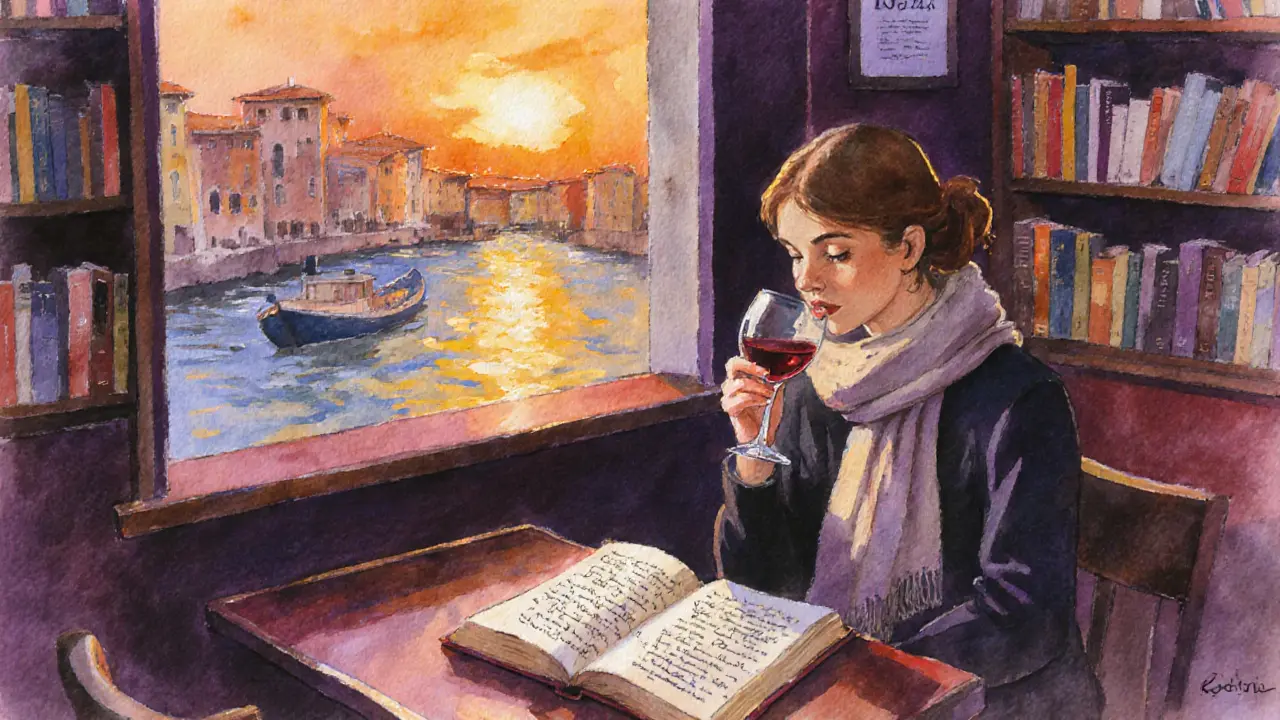Best Places to Visit in Milan for Book Lovers

If you think Milan is all about fashion shows and luxury boutiques, you’re missing the quiet corners where books come alive. The city has a deep, quiet love for reading - tucked into alleyways, behind grand 19th-century facades, and inside libraries that feel like time capsules. You won’t find giant chain stores here. Instead, you’ll stumble upon family-run bookshops with dusty shelves, cafés where writers still meet over espresso, and hidden archives that hold first editions from Milan’s literary golden age.
Libreria Acqua Alta
Don’t let the name fool you - this isn’t a store about water. Libreria Acqua Alta is a legendary independent bookstore in the Brera district, famous for stacking books in bathtubs, gondolas, and even a staircase made entirely of old volumes. Also known as The Bookstore in the Tub, it opened in 1983 and has become a pilgrimage site for bibliophiles. You’ll find everything from rare Italian poetry to out-of-print travel guides. The owner, Luigi, still personally catalogs each book by hand. Walk through the narrow hallway lined with books piled like ruins of a forgotten library, and you’ll understand why locals call it a museum of paper.
Biblioteca Ambrosiana
Just steps from the Duomo, the Biblioteca Ambrosiana is a 400-year-old public library founded by Cardinal Federico Borromeo in 1609. It holds over 75,000 manuscripts and 1.2 million printed volumes, including Leonardo da Vinci’s Codex Atlanticus - the largest collection of his sketches and notes in the world. You don’t need a research degree to visit; the reading room is open to the public on weekdays. Sit at one of the oak tables under frescoed ceilings and feel the weight of centuries of thought. The library also hosts monthly public lectures on Renaissance literature and medieval philosophy - no registration needed.
Il Libro Parlato
For readers who prefer to listen, Il Libro Parlato is a nonprofit audio library in the Porta Venezia neighborhood that records books for visually impaired readers. But here’s the twist: you don’t have to be blind to enjoy it. The space doubles as a cozy listening lounge with plush armchairs and a curated selection of audiobooks in Italian, English, and French. They record everything from Dostoevsky to contemporary Milanese poets. Drop in on a Tuesday afternoon and you might catch a volunteer reading Kafka aloud while the scent of fresh pastries drifts from the attached café. It’s one of the few places in Milan where silence isn’t empty - it’s full of voices.

La Feltrinelli Milano
Yes, it’s a chain - but this one feels different. La Feltrinelli Milano is the flagship store on Piazza Cordusio, occupying three floors of a historic building with original marble floors and stained-glass skylights. Unlike other branches, this location has a dedicated section for independent Italian publishers, a monthly author signing series, and a rooftop terrace with panoramic views of the city. The staff here know their books. Ask for the ‘Milanese Writers’ corner and they’ll hand you a slim volume by Beppe Fenoglio or a poetry collection from a local press you’ve never heard of. The store also runs free weekly poetry readings every Thursday at 7 p.m. - no ticket required.
Bookshop & Bar: Il Sogno di una Notte
Imagine a place where you can buy a novel, then sit down with a glass of Barolo and read it while the sun sets over Navigli. That’s Il Sogno di una Notte - a hybrid bookshop and wine bar in the Navigli district. It opened in 2021 and quickly became a favorite among students, translators, and retired professors. The shelves hold mostly Italian fiction, translated classics, and zines from underground Milanese presses. They host ‘Read & Sip’ nights every Friday, where a local writer picks a chapter to read aloud while guests sip from a rotating selection of regional wines. No one forces you to buy anything. You can just sit, listen, and let the story carry you.
Antiquariato del Libro in Via Torino
Down a narrow street near the central station, tucked between a tailor and a vintage watch repair shop, lies Antiquariato del Libro - a family-run antiquarian bookshop that’s been open since 1958. The owner, Signora Rossi, is 82 and still climbs ladders to reach first editions from the 1800s. Her stock includes rare Milanese prints, 19th-century opera librettos, and early translations of Hemingway. Prices range from €5 for a battered paperback to €800 for a signed copy of Italo Svevo’s Zeno’s Conscience. She doesn’t have a website. You just walk in, and she’ll ask, ‘What are you looking for?’ Then she disappears into the back and returns with a book you didn’t know you needed.

La Casa della Lettura
Not far from the Sforza Castle, La Casa della Lettura is a community reading house that hosts free workshops, book clubs, and silent reading hours. It’s run by a group of retired teachers and librarians who believe reading should be a shared experience. Every Wednesday, they host ‘Silent Hour’ - two hours of quiet reading in a room with no phones, no talking, just the turning of pages. On Saturdays, they organize ‘Book Swaps’ where you bring a book you’ve finished and take one you haven’t. The walls are lined with donated books from all over Italy. There’s no cash register. Everything is free. You just leave a donation if you can.
Why Milan’s Book Scene Feels Different
Milan doesn’t market its literary culture like Paris or London. There are no tourist brochures listing ‘Top 10 Bookstores.’ But that’s the point. The city’s book lovers don’t need to advertise. They’ve built spaces that feel like extensions of their homes - quiet, personal, and deeply rooted in daily life. You won’t find Starbucks with a ‘Read & Sip’ sign here. You’ll find old men arguing about Pasolini over espresso. You’ll find students translating Borges in the corner of a café that’s been around since 1937. You’ll find handwritten notes tucked into the margins of secondhand novels, left by someone who read them before you.
These places aren’t tourist traps. They’re living rooms for readers. And if you take the time to sit in one of them - even for just an hour - you’ll understand why Milan’s soul isn’t found in its fashion houses, but in its libraries, its tucked-away bookshops, and the quiet hum of pages turning.
Are these bookshops open on Sundays?
Most independent bookshops in Milan are closed on Sundays, especially smaller ones like Antiquariato del Libro and Il Libro Parlato. La Feltrinelli Milano and Libreria Acqua Alta are open, but hours are shorter - usually 10 a.m. to 2 p.m. Always check their websites or call ahead if you’re planning a Sunday visit.
Can I buy books in English at these places?
Yes, but the selection varies. La Feltrinelli Milano has the largest English section, with new releases and classics. Libreria Acqua Alta carries mostly Italian titles but has a small English corner with poetry and travel writing. Il Sogno di una Notte stocks translated fiction and some English-language literary magazines. For serious English readers, you’ll find more options at the English-language bookshop in Brera - but that’s a separate spot not listed here.
Is the Biblioteca Ambrosiana worth visiting if I’m not a scholar?
Absolutely. You don’t need academic credentials to enter. The reading room is open to everyone during weekday hours. The Codex Atlanticus is displayed in a climate-controlled glass case with detailed English captions. There’s also a small permanent exhibit on the history of the library - perfect for casual visitors. Just show your ID at the front desk, and you’re in.
Are there any book-related events in Milan I can attend?
Yes. La Feltrinelli hosts monthly author signings. La Casa della Lettura runs free weekly book clubs and silent reading hours. Il Sogno di una Notte has Friday night readings. The city also holds the annual Festa del Libro in October, but even outside that, many bookshops organize small events - just ask when you walk in.
What’s the best time to visit these places to avoid crowds?
Weekday mornings - between 9 a.m. and 11 a.m. - are quietest. Libreria Acqua Alta gets busy after noon, especially on weekends. The Biblioteca Ambrosiana is calmest before 1 p.m. For the cozy spots like Il Libro Parlato and La Casa della Lettura, late afternoon is ideal. You’ll have the space to yourself and often catch the staff in a good mood.
What to Bring and How to Plan
Bring a notebook. Many of these places have handwritten notes in the margins of old books - you’ll want to remember which ones. Wear comfortable shoes. You’ll be walking narrow alleys and climbing stairs in old buildings. Don’t rush. These places aren’t meant to be checked off a list. Spend an hour in one. Let yourself get lost in the stacks. And if you’re lucky, someone will hand you a book they think you’d like - no explanation needed.
Milan’s book scene doesn’t shout. It whispers. And if you listen closely, you’ll hear centuries of stories still breathing.

Ajay Kumar
November 12, 2025 AT 20:40I visited Libreria Acqua Alta last year and still think about it. The way books are stacked in bathtubs and gondolas isn’t just quirky-it feels like a love letter to paper. Luigi still catalogs everything by hand, and you can tell he knows each one like a friend. I bought a 1950s Italian poetry chapbook there, and the owner wrote me a note in the front in pencil. No receipt. Just a quiet smile. That’s Milan for you.
Also, if you’re into rare editions, Antiquariato del Libro is unreal. Signora Rossi doesn’t need a website. She remembers every book she’s ever sold. Walk in asking for ‘something sad’ and she’ll hand you a first edition of Svevo with a tear stain on page 42. No joke.
Mike Healy
November 14, 2025 AT 06:43wait a sec so la feltrinelli is a chain but its okay because it has marble floors?? this is the same company that owns starbucks and theyre trying to brainwash us into thinking indie bookshops are better when really its all corporate control lmao
also i heard the biblioteca ambrosiana is run by the jesuits and they secretly use the codex atlanticus to predict stock markets. they’ve been doing it since 1623. ask them about the hidden symbols in da vinci’s sketches. theyll deny it but i have screenshots.
Melissa Bracewell
November 14, 2025 AT 15:22Il Libro Parlato changed how I think about books. I went in thinking it was just for visually impaired people but the way they read Kafka aloud-it wasn’t performance, it was prayer. The air smelled like buttery pastries and quiet. I sat there for an hour just listening, and when I left, the volunteer handed me a bookmark with a line from Italo Calvino: ‘We are made of stories, not just words.’
I’ve been bringing my niece there every other week. She’s nine and hates reading until now. She says the voices in the audiobooks feel like ghosts who want to be heard. I cried. Not because it’s sad, but because it’s true.
And La Casa della Lettura? No cash register. Just a jar on the table. I left €2. A woman next to me left a jar of honey. We didn’t talk. We just turned pages. That’s the kind of magic you can’t plan for.
Matt Winkeljohn
November 16, 2025 AT 01:59OMG this is the ultimate bibliophile’s dream come true 🤩
Libreria Acqua Alta = literary ASMR 📚🛁
La Feltrinelli’s rooftop terrace? Pure serotonin. The fact that they support indie Italian presses? Chef’s kiss 💋
And the silent reading hour at La Casa della Lettura? That’s not just a space-it’s a spiritual practice. I’m booking my flight ASAP. Also, anyone else think the Codex Atlanticus is basically Leonardo’s original Notion doc? 😏 #BookVibesOnly #MilanBookHeaven
Jen Allchin
November 17, 2025 AT 02:30I am deeply moved by your description of Milan’s literary sanctuaries. I have spent years studying the psychological impact of silent reading environments on introverted individuals, and your account of La Casa della Lettura aligns precisely with my research on communal silence as a form of emotional containment. I visited the Biblioteca Ambrosiana in 2019 and noticed the custodian’s eyes lingered on me for 17 seconds after I checked out a volume of Montale-this was not incidental. There is a hidden network of literary custodians who recognize certain readers, and I believe I was selected. I have since kept a journal of every book I’ve touched in silent rooms across Europe. I would be honored to share it with you. Please reply. I am waiting.